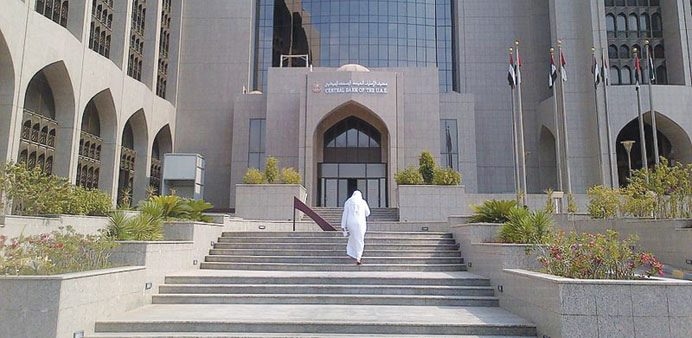Existing law grants the UAE’s central bank control over interest rates, but this is negated by the fact the UAE dirham is pegged to the dollar and so rate movements mimic policy in the US.
Reuters/Abu Dhabi
Authorities in the UAE are discussing changes to the country’s banking law which would give the Gulf state’s central bank a role in determining monetary policy, the central bank governor told Reuters yesterday.
Existing law grants the central bank control over interest rates, but this is negated by the fact the UAE dirham is pegged to the dollar and so rate movements mimic policy in the US.
The UAE is currently overhauling its banking law dating back to 1980 and while he wouldn’t be drawn on details in his rare comments, the governor hinted at a greater role for his agency in directing UAE policy.
“The law aims to empower the central bank board in determining the direction of monetary policy in consistency with the requirements for the national economy,” Mubarak Rashid al-Mansouri said in an e-mailed response to questions from Reuters.
Currently, most policy decisions are made by the government, with ultimate sign-off needed from the President, Sheikh Khalifa bin Zayed al-Nahayan.
However, international bodies such as the International Monetary Fund have recommended independence for the central bank, while upcoming changes stemming from Basel III rules are also forcing regulators to examine existing structures and practices.
While the planned changes would give the UAE central bank a greater degree of independence, core strategic decisions would likely remain in the hands of the government, an executive at an Abu Dhabi bank said, declining to be identified due to the sensitivity of the matter.
The amended banking law will also place responsibility for financial stability with the central bank, the governor said, including by “stipulating measures for macro-prudential tools and direct instruments to stem the risk in the financial sector and align credit indicators with macro-economic objectives”.
The central bank currently governs commercial banks and money supply, with other agencies also playing roles in maintaining the health of financial markets.
Al-Mansouri, appointed in September, said he expected UAE credit growth to remain robust and that there was excess liquidity in the banking system, judged by banks’ holdings of deposits and certificates of deposits at the central bank.
At the end of April, cash in banks’ current accounts at the central bank totalled 23.1bn dirhams ($6.29bn) and certificates of deposit (CDs) held by banks were worth 90bn dirhams, according to central bank data.
While the former has only been higher in one month since at least December 2013, the amount of CDs held by banks was at its lowest level since October 2012.
Banks in the UAE have been cash-rich for a number of years, bolstered by deposits accrued during the period of high oil prices. Lending to stable resources (which include deposits in the banking system, term funds, capital and reserves) ratio is 86%, Mansouri said.
While lending was sluggish in the early part of the decade, as banks recovered from the effects of a real estate crash and debt problems at Dubai state-linked companies, it has picked up in recent months - growing 8.4% in the year to April.
“We expect credit growth to remain robust,” al-Mansouri said.

